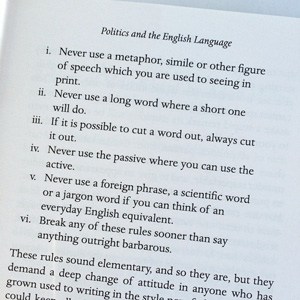Best known for his novels ‘Animal Farm’, ‘The Road To Wigan Pier’ and, ‘Nineteen Eighty-Four’, Eric Arthur Blair, AKA George Orwell, was also a keen essayist, journalist, novelist, and critic. It was this combined experience that influenced Orwell to create his own rules for writing. Six of them to be precise.

Orwell’s rules for writing
As a copywriter, of all of Orwell’s’ work, it’s his 1945 essay ‘Politics and The English Language’ that stands out. Sounds pretty dry and uninteresting, that’s for sure. But on learning that it was only 32 pages long, I thought I ought to get to grips with it.
So, back in 2014, when it first came to my attention, I got stuck into it on a train from Exeter to London and finished it off somewhere just south of Bristol.
What’s it all about?
It’s basically an essay on the importance of using clear and precise language in any kind of writing. Orwell was concerned about language and clarity and spells out that people in positions of power (i.e. politicians) usually use confusing and unclear language to baffle the general public.
While this is true – and definitely remains so today – to overcome this, Orwell created his list of six writing rules he believed all writers should stick to. So what are they and what do they mean?
George Orwell’s rules for writing
i. ‘Never use a metaphor, simile or other figure of speech which you are used to seeing in print.’
What it means: Don’t overload your copy with clichés or a figure of speech that’s overused, as your copy will lose its impact.
ii. ‘Never use a long word where a short one will do.’
What it means: Make your copy easier to read by using clear, simple words instead of long or complicated ones.
iii. ‘If it is possible to cut a word out, always cut it out.’
What it means: Make your copy sharper and easier to read by cutting out any unnecessary words that don’t add value.
iv. ‘Never use the passive where you can use the active.’
What it means: Using the active voice will make your copy clearer, stronger, and more direct.
v. ‘Never use a foreign phrase, a scientific word or a jargon word if you can think of an everyday English equivalent.’
What it means: Using simple language in your copy will make it more inclusive, accessible, and readable for a wider audience.
vi. ‘Break any of these rules sooner than say anything outright barbarous’
What it means: If following any of the six rules means your copy sounds more unclear, awkward, or confusing, then feel free to break the rule and find a better, simpler way to say it.
Obviously, this isn’t an extensive or exhaustive guide to writing well. But the key takeaway in all this is that clarity is the most important goal in any copywriting, even if it means bending the rules sometimes – or breaking them!
Orwell’s rules for writing will stand any writer in good stead, whatever the subject. But for a copywriter, they’re essential and just as relevant now as they were 80 years ago, proving that nothing has really changed.
“Language is a political issue, and slovenly use of language and cliches make it easier for those in power to deliberately use misleading language to hide unpleasant political facts.”
– George Orwell
Want copywriting for your business that’s as sharp, impactful, and jargon-free as Orwell’s? Whether you need website copy, regular blogs, or product descriptions, I can help. Check out my copywriting services, and let’s talk about getting you some copy that connects, inspires, and converts. Get in touch, and let’s get started!




